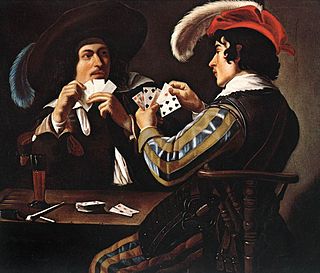
A card game is any game using playing cards as the primary device with which the game is played, be they traditional or game-specific.
Five-card draw is a poker variant that is considered the simplest variant of poker, and is the basis for video poker. As a result, it is often the first variant learned by new players. It is commonly played in home games but rarely played in casino and tournament play. The variant is also offered by some online venues, although it is not as popular as other variants such as seven-card stud and Texas hold 'em.

Poker is a family of comparing card games in which players wager over which hand is best according to that specific game's rules. While the earliest known form of the game was played with just 20 cards, today it is usually played with a standard deck, although in countries where short packs are common, it may be played with 32, 40 or 48 cards. Thus poker games vary in deck configuration, the number of cards in play, the number dealt face up or face down, and the number shared by all players, but all have rules that involve one or more rounds of betting.

A stripped deck or short deck (US), short pack or shortened pack (UK), is a set of playing cards reduced in size from a full pack or deck by the removal of a certain card or cards. The removed cards are usually pip cards, but can also be court cards or Tarot cards. Many card games use stripped decks, and stripped decks for popular games are commercially available.

Texas hold 'em is one of the most popular variants of the card game of poker. Two cards, known as hole cards, are dealt face down to each player, and then five community cards are dealt face up in three stages. The stages consist of a series of three cards, later an additional single card, and a final card. Each player seeks the best five card poker hand from any combination of the seven cards; the five community cards and their two hole cards. Players have betting options to check, call, raise, or fold. Rounds of betting take place before the flop is dealt and after each subsequent deal. The player who has the best hand and has not folded by the end of all betting rounds wins all of the money bet for the hand, known as the pot. In certain situations, a "split-pot" or "tie" can occur when two players have hands of equivalent value. This is also called a "chop-pot". Texas hold 'em is also the H game featured in HORSE and in HOSE.
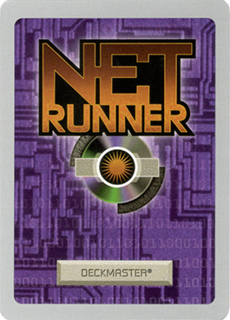
Netrunner is an out-of-print collectible card game (CCG) designed by Richard Garfield, the creator of Magic: The Gathering. It was published by Wizards of the Coast and introduced in April 1996. The game took place in the setting for the Cyberpunk 2020 role-playing game (RPG), but it also drew from the broader cyberpunk genre.

Deadlands is a genre-mixing alternate history role-playing game which combines the Western and horror genres, with some steampunk elements. The original game was written by Shane Lacy Hensley and published by Pinnacle Entertainment Group in 1996.

Alderac Entertainment Group, or AEG, is a publisher of role-playing game, board game, and collectible card game products. AEG was formed by Jolly Blackburn in 1993 and is based in the city of Ontario, California. Prior to getting into their current markets, AEG was involved in hobby gaming magazines, with their first product the magazine Shadis.

Cosmic Encounter is a science fiction–themed strategy board game designed by "Future Pastimes" and originally published by Eon Games in 1977. In it, each player takes the role of a particular alien species, each with a unique power to bend or break one of the rules of the game, trying to establish control over the universe. The game was inducted into the Academy of Adventure Gaming Arts & Design Adventure Gaming Hall of Fame in 1997.

Legend of the Five Rings is a fictional setting created by John Zinser, Dave Seay, Ryan Dancey, Dave Williams, DJ Trindle, Matt Wilson and John Wick and first published by a joint venture between Alderac Entertainment Group and ISOMEDIA in 1995. The setting primarily involves the fictional empire of Rokugan, though some additional areas and cultures have been discussed. Rokugan is based roughly on feudal Japan with influences from other East Asian cultures such as China, Mongolia and Korea. This setting is the basis for the Legend of the Five Rings Collectible Card Game as well as the Legend of the Five Rings Roleplaying Game. Legend of the Five Rings was also the "featured campaign setting" of the Oriental Adventures expansion to the third edition of Dungeons & Dragons, though this book is now out of print.

Doomtown: Reloaded is an expandable card game based on the Deadlands role-playing game. It was originally a collectible card game that ran from 1998 through 2001 and was revived as the Reloaded version in 2014.
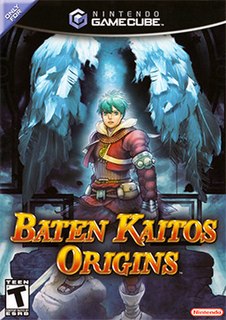
Baten Kaitos Origins is a 2006 role-playing video game developed by Monolith Soft and Tri-Crescendo for the GameCube video game console. The game is a prequel to Baten Kaitos: Eternal Wings and the Lost Ocean. Similar to the first entry, the player assume the role of a "guardian spirit" – an unseen player avatar – who guides protagonist Sagi and his party of companions in an adventure across an aerial floating island-based kingdom in the clouds. The game retains the original's focus around the concept of "Magnus" - magical cards that capture the "essence" of items found in the in-game world, where the concept is still used as a plot device, for in-game item management, and as a basis for the card-themed battle system, albeit with minor tweaks. Unlike the first game, which was published by then-Monolith Soft owner Namco, Origins was published by Nintendo, and was not released in Europe. It was released on February 23, 2006, in Japan, and in North America on September 25, 2006.
A diceless role-playing game is a role-playing game which is not based on chance: it does not use randomisers to determine the outcome of events in its role-playing game system. The style of game is known as "diceless" because most games use dice as their randomiser; some games such as Castle Falkenstein use other randomisers such as playing cards as substitutes for dice, and are not considered "diceless".

A game is a structured form of play, usually undertaken for entertainment or fun, and sometimes used as an educational tool. Many games are also considered to be work or art.
The following is a glossary of poker terms used in the card game of poker. It supplements the glossary of card game terms. Besides the terms listed here, there are thousands of common and uncommon poker slang terms. This is not intended to be a formal dictionary; precise usage details and multiple closely related senses are omitted here in favor of concise treatment of the basics.
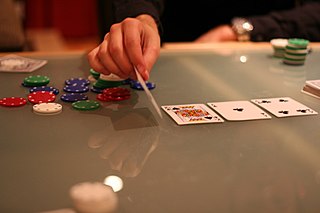
Community card poker refers to any game of poker that uses community cards, which are cards dealt face up in the center of the table and shared by all players. In these games, each player is dealt an incomplete hand face down, which are then combined with the community cards to make a complete hand. The set of community cards is called the "board", and may be dealt in a simple line or arranged in a special pattern. Rules of each game determine how they may be combined with each player's private hand. The most popular community card game today is Texas hold 'em, originating sometime in the 1920s.
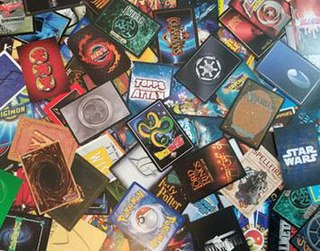
A collectible card game (CCG), also called a trading card game (TCG) among other names, is a type of card game that mixes strategic deck building elements with features of trading cards, introduced with Magic: The Gathering in 1993.
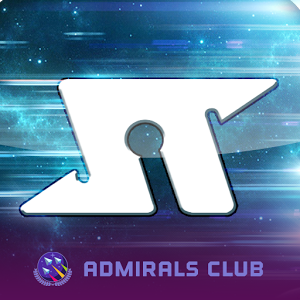
Spaceteam is a free-to-play local cooperative multiplayer video game developed and published by Henry Smith of Canadian studio Sleeping Beast Games for iOS and Android operating systems. It was released on December 1, 2012 and is described as a "cooperative shouting game for phones and tablets". The game uses multiple smartphone or tablet devices, connected via wifi or bluetooth, to enter a shared game of two to eight players.
A roguelike deck-building game is a hybrid genre of video games that combine the nature of deck-building card games with procedural-generated randomness from roguelike games.













